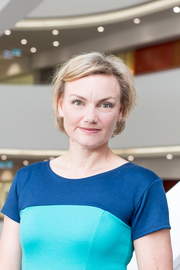

Dr Freeman said she joined Twitter in 2007, when every tweet was received as a text message. As part of her PhD, she was the first researcher to publish papers on tobacco product promotions through the online social media websites YouTube and Facebook.
“I love social media,” she said. ”Social media was just happening when I got involved. It was a golden opportunity”.
While researchers were often loathe to think about self-promotion, she urged them to consider their digital footprint and to grow their digital reputation by using Twitter and other platforms like Google Scholar.

“Think of Twitter as a responsible use of the taxpayer money that has funded your research.”
Dr Freeman outlined the following reasons why researchers should use Twitter in their work:
Why researchers should join the Twitter conversation
- Your digital footprint is important and Twitter can help build that footprint
- You have a responsibility to self-promote your findings, and Twitter can help do that
- Twitter has an engaged audience – journalists and policy people like it
- It enables you to make connections, and can lead to new collaborations and research projects
- It helps you to build networks, and can be a key tool in reaching out to others
- You can follow what’s happening at conferences from afar
- You can stay up to date with what’s happening and what’s being published in your field
- It enables community outreach
- Research can be a lonely job – Twitter can give support and camaraderie with other researchers
Dr Freeman acknowledged there were perceived drawbacks with Twitter, including concerns about blurring of professional and personal boundaries and about privacy, as well as a common belief among researchers that they simply didn’t have time for Twitter.
However, she said if researchers used the platform in a strategic way and just devoted a couple of short periods of time each day to Twitter, they could overcome those concerns.
“We all have time for this stuff,” she argued. “It’s as essential as being on top of political news and the developments in your field.”
How to get started
Dr Freeman also offered researchers who are new to Twitter some tips on getting started:
- Choose a Twitter handle (or name) that is professional and timeless
- Use a photo of yourself that looks professional on your account, and use the same photo across social media platforms so you are easily recognised
- If you want to tweet about a hobby or non-professional passion, set up a separate Twitter account for that purpose
- Be strategic in who you follow, so you aren’t swamped by information
- Ensure your tweets are readable
- Be genuine and authentic in your tweets
- Be inclusive
- Be responsive
- Evaluate to ensure you are getting what you want out of Twitter
Find out more
- Follow Dr Freeman: @DrBFreeman
- Follow the Sax Institute: @SaxInstitute
- Read the Public Health Research & Practice paper by Dr Freeman and Professor Simon Chapman: Who has Australia’s most-followed Twitter accounts in health and medicine.





